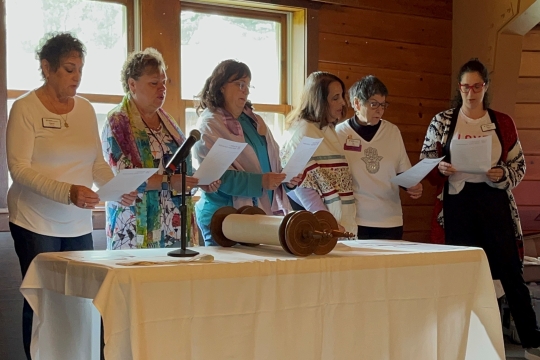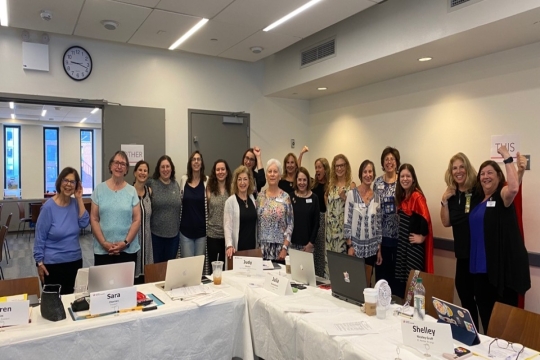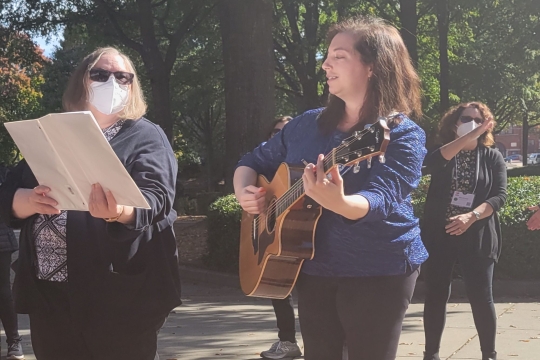
Reading through this week’s Torah portion, Va-eira, brought back memories of growing up in Apartheid South Africa, where ‘Non-Whites’ had to carry ‘passes’, were banned from attending movies and theatre, eating in restaurants, had their own buses and special “Non-Whites Only” benches, toilets and beaches.
Thankfully that all changed in 1994 when Nelson Mandela came into power.
Sisterhoods throughout South Africa, starting in the Apartheid years and continuing their good work today, do outreach work in the impoverished areas. Some examples are the M.C. Weiler School in Alexandra Township in Johannesburg, started by the United Sisterhood; the Mitzvah School situated on the premises of Bet David in Johannesburg where learners are taught in their final year of school, enabling them to get good grades and university entrances.
None of the above activities were carried out without their own share of drama over the years.
So too is this week’s Torah portion, Va-eira, full of drama, including most of the 10 Plagues needed to bring the Israelites out of slavery. Moses has just been commissioned as God’s mouthpiece and is designated as the person to deliver the divine message of redemption to the people of Israel and to Pharaoh. Before the action, however, the Parsha opens with God’s private declaration to Moses:
“I am Adonai and/but I offered a revelation of myself to Abraham, Isaac and Jacob in the name of Almighty God (El Shaddai); I wasn’t known to them as Adonai”. What can we make of God’s mysterious self-introduction? What too can we make of the way in which the Torah presents the plagues?
Several well-known Jewish commentators focus on God’s continuity over time. This is the same God who dealt with the patriarchal families, who promised that their descendants would become numerous and would inherit a homeland. The nature of God’s relationship with the ancestral generations may have been different from what it would become in Moses’s time or later. God may have been known by different names or may have related to humans by emphasizing different attributes as the times demanded. Nonetheless, Abraham’s God and Moses’s God are one and the same deity.
Let us now return to the action part of the Parsha…. The Plagues…. In effect, the plagues are an answer to the question Pharaoh posed to Moses in Exodus 5:2 from last week’s reading.
“Who is this Adonai that I should listen to Adonai’s voice and send out Israel?” At God’s direction, Moses and Aaron use the plagues, invoking them - one at a time - to bring increasing pressure on Pharaoh to release the Israelites. Over the centuries, the plagues have been analysed, noting the severe incentives to motivate Pharaoh’s capitulation. Seven of the plagues, notably blood, frogs, lice, swarms of insects, animal disease, boils and hail, appear in this week’ s Parsha and when these are not sufficient to compel Pharaoh’s release of the Israelites, next week will appear locusts, darkness and finally death of the first-born.
Why are the plagues brought one at a time? Why not all together? And why not leave out the minor ones and go straight to the most damaging?
Moses is trying to negotiate Israel’s freedom, using the plagues primarily to strengthen his negotiating position. Then the first four plagues occur, after which Pharaoh is willing to negotiate … or so it seems. Moses asks for the Israelites’ release to go celebrate to God and Pharaoh agrees to this, but only within the land itself. Moses says that isn’t good enough, that the people need to go a distance of three days’ journey, since their sacrificing would be objectionable to the Egyptians. Pharaoh agrees to let them sacrifice out in the desert, as long as they don’t go “too far” away.
Something, however causes Pharaoh to change his mind, and he refuses to release Israel.
In next week’s Parsha, after three more plagues, Pharaoh will again negotiate, about which Israelites must be permitted to go. Pharaoh’s offer is to release only the men; Moses says that all the Israelites must be permitted to go. Pharoah refuses, but then changes his mind after yet another plague is brought upon Egypt. Pharaoh and Moses continue to negotiate. Then finally, after the last devastating plague, Pharaoh agrees to all of Moses’s demands, when the Israelites, under divine protection, are finally released.
Perhaps this is a lesson for today. Negotiations work, as long as there is sufficient force to back them up. And one should never abandon talks whilst there is a chance to avoid further conflict and devastation.
Giddy Lief is the National President of Women of Progressive Judaism- South Africa (WPJ-SA).
Related Posts

Parashat Yom Rishon shel Rosh HaShanah

Cultivating a Culture of Accountability and Belonging

